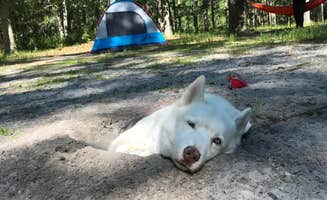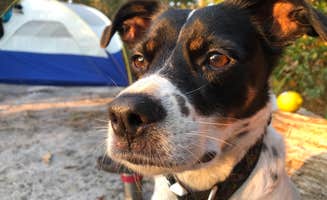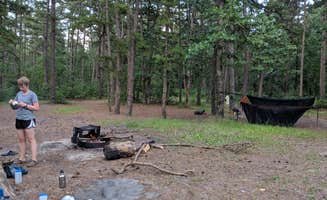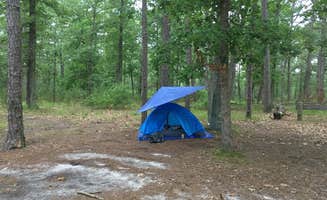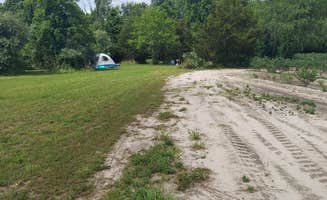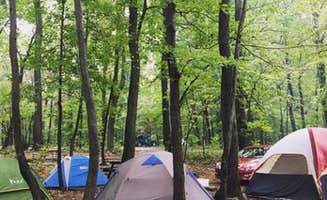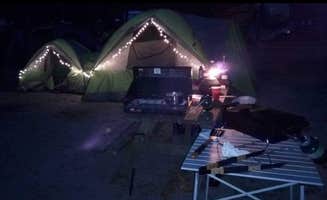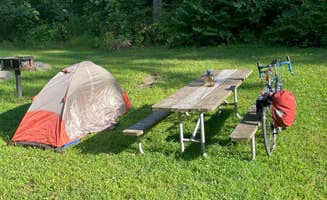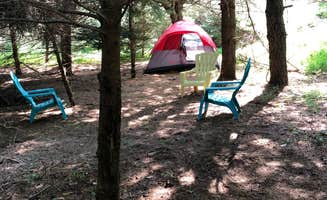Tent camping opportunities in Willingboro, New Jersey extend beyond the Pine Barrens into diverse woodland settings within a 40-mile radius. Summer temperatures average 85°F during peak camping season with frequent afternoon thunderstorms from June through August. Sandy soils throughout the region's campgrounds drain quickly after rain, making most tent sites usable even after heavy precipitation.
What to do
Hiking the Batona Trail: Access this 53-mile trail directly from Batona — Wharton State Forest for day hikes or multi-day backpacking trips. The trail connects multiple campgrounds through relatively flat terrain. "Located right off the Batona trail you're bound for adventure," notes James R., who appreciates how the trail network allows campers to "disappear for a weekend."
Historical exploration: Visit Washington Crossing State Park to experience Revolutionary War history through interpretive programs. "Every year, they re-enact Washington's troops crossing the Delaware! It was VERY cold the year I went," shares David S. The park contains both natural areas and historical sites, with Olivia M. noting there are "farms and animals to see, hikes along the Delaware river, Bowman's tower with a great view."
Reservoir activities: At Round Valley State Park Campground, filter water directly from the reservoir for drinking rather than using the well pumps. "We just filtered the water from the reservoir instead which tasted a million times better than the well water," reports James R. The reservoir features exceptionally clear water, as Riley K. confirms: "the water is very clean and crystal clear."
What campers like
Privacy between sites: At Goshen Pond — Wharton State Forest, many tent sites offer seclusion despite the open layout of the campground. "The boyfriend and I stayed for a weekend at one of the primitive tent sites. Our site was private and secluded," reports Ashley R. This makes the campground popular even during peak summer weekends.
Easy water access: Campers frequently mention the convenience of putting watercraft directly into the water from their campsites. Anna D. shares that at Goshen Pond, "We were able to put our kayaks in right next to the site which was very convenient." Wayne S. similarly notes about Washington Crossing State Park: "The camp ground is secluded and right on the Delaware River. Very enjoyable."
Pine forest environment: The distinctive Pine Barrens ecosystem creates a unique camping atmosphere unlike other East Coast forests. Alyssa D. emphasizes this at Batona Campground: "It is so easy to get lost in these woods and I LOVE IT! If you want off the beaten path and not close to anyone... this is IT!" The pine forest creates natural site separation and distinctive camping conditions.
What you should know
Aggressive insects: Ticks and chiggers pose a significant risk throughout the region from April through October. "Great sites, great trails, lots of hiking and off road trails... Just gotta check often for chiggers and ticks," warns Eldad K. about Goshen Pond. Campers should bring appropriate repellents and conduct regular tick checks.
Reservation challenges: Most tent sites in the region require advance booking through the New Jersey State Park reservation system, with limited first-come sites. Weekend slots fill 2-3 months in advance during summer. "Checking in is slow so come early," advises Dania J. about Mullica River — Wharton State Forest.
Access limitations: Many of the region's most desirable tent sites require physical effort to reach. At Round Valley, campers face significant hiking distances. Janine W. explains: "Some of the sites are at least 3 miles to get to unless you take a boat across." For certain campgrounds, gear transport requires planning and physical readiness.
Primitive facilities: Most tent campgrounds feature basic amenities only. "Bathrooms are very basic. Fresh water pump is located at entrance to campground," reports Meghan G. about Batona Campground. Campers should expect pit toilets, limited water access, and pack-in/pack-out trash policies at most sites.
Tips for camping with families
Accessible recreation sites: For families with young children, Tip Tam Camping Resort offers amenities designed specifically for kids. "The place was fun.. they have peddle cars and playgrounds. They deliver wood to your site by the truck full!" reports Jenn M. Dave B. adds that there are "two pools, an RC track, bocci, shuffle and board" among the activities available.
Early rising expectations: Family campgrounds tend to become active early in the morning. "Don't expect to sleep past 7:30am," warns Bill V. about Tip Tam, noting that by "7am place was already loud" with routine campground activities starting shortly after sunrise. Families should plan accordingly with early bedtimes or noise-canceling solutions.
Day-use alternatives: Several parks allow non-campers to access swimming and picnic facilities for daily fees between $5-10 per vehicle. Seth S. describes Washington Crossing State Park: "The areas for that seemed well groomed, bathrooms were acceptable, and there was plenty of space. Some nice trees not too close allowed for good shade, without feeling like in a forest."
Tips from RVers
Group sites for larger vehicles: Group Camp — Ridley Creek State Park accommodates small to medium-sized RVs in its group camping areas. "I love camping at Ridley creek. Very peaceful," notes Chuck C. The park offers electric hookups and water connections, though space is limited to designated group camping zones.
Road conditions to primitive sites: Access roads to many of the region's tent-focused campgrounds present challenges for larger vehicles. At Batona Campground, "The road into the campground is about 1 mile of loose sand. It can be accessed by a standard vehicle," explains Meghan G., who adds that "The unpaved road into the site is narrow and tree lined. A larger RV would not fit."
Site surface considerations: Sandy soil throughout regional campgrounds affects RV leveling and stabilization. Some sites offer firmer surfaces than others, and seasonal conditions can impact stability. Even at more developed campgrounds like Tip Tam, Jenn M. notes "there are no trees. It feels like you're camping out in a field with mostly sand around."


